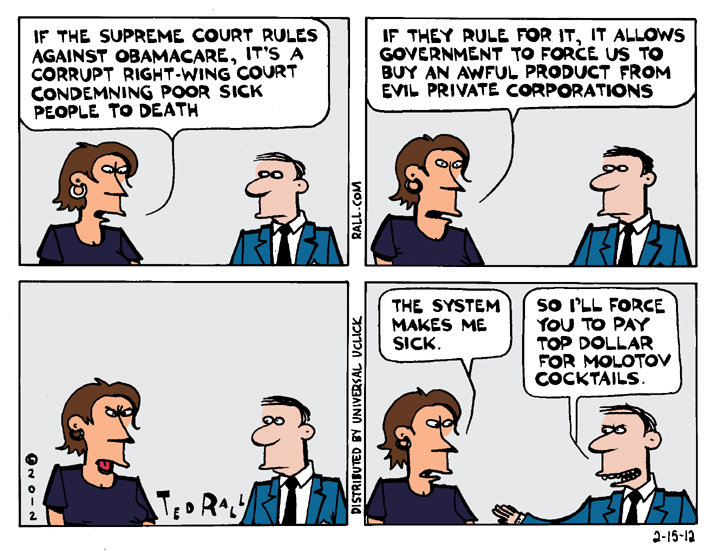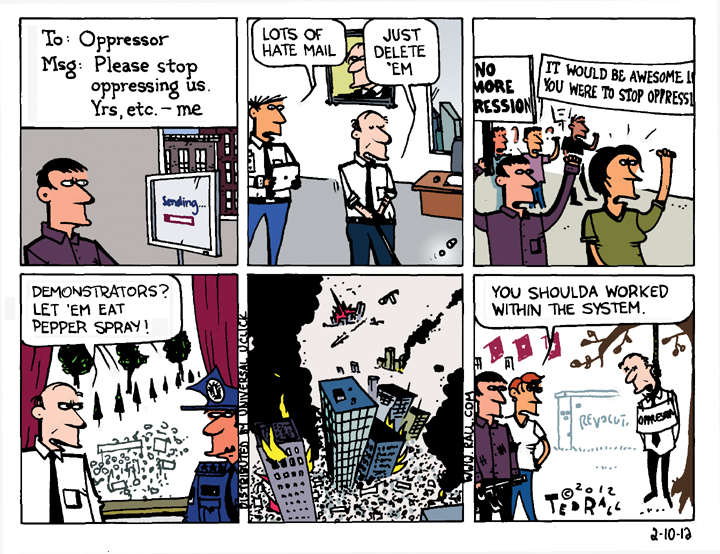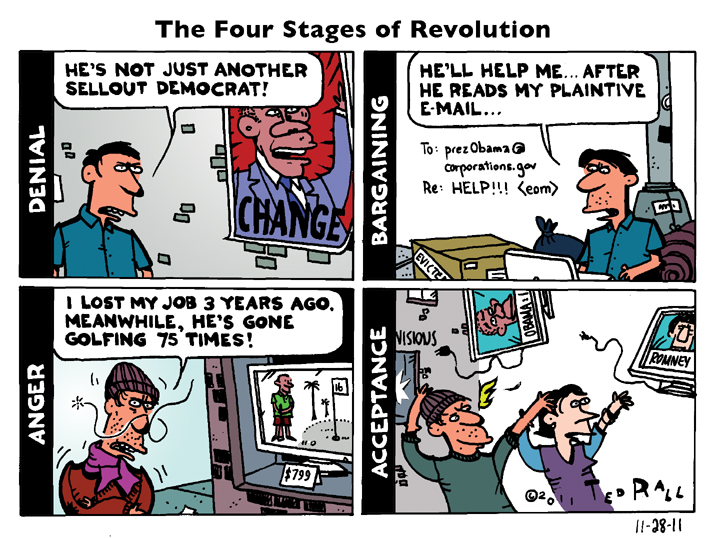Not a Revolution, Just a Useless Protest
Two years ago, when I was in the Occupy movement, my comrades and I argued about revolution. Was revolution necessary? What is it? The split that destroyed our movement — as it did the Left during the Sixties — pitted revolutionaries against reformists. The most frustrating part of the debate, however, wasn’t ideological. It was linguistic.
Even on the Left, few Americans know what revolution is: the violent overthrow of the ruling classes. In a revolution, everything — beginning with the power structure — changes.
The Tahrir Square encampments that led to the ouster of Egyptian autocrat Hosni Mubarak were a huge influence on Occupy. But we couldn’t agree about what they meant. Was Tahrir a “revolution”?
No doubt, the 2011 Arab Spring was a powerful mass movement. Everyone agreed about that. For reformists — people who want to fix the system rather than replace it — Tahrir Square was a perfect example to emulate: a peaceful people-power transition that changed things for the better without shedding blood. Cut-and-paste the same phenomenon from Cairo to the United States — convince millions of peaceful demonstrators to camp out in American cities to demand change — and you’d get similarly dramatic results, reformist Occupiers urged. “Egypt had a peaceful revolution,” they said.
Revolutionaries — people who want to get rid of the existing system and start from scratch — countered that the Arab Spring uprisings were not revolutions at all and were thus insufficent. “Tunisia and Egypt,” I said, “were merely personnel changes.” The system, the way society, politics and the economy are organized, remained unchanged.
As recent events prove, the resignation of a president does not a revolution make.
In all the ways that matter, post-Mubarak Egypt remains the same. Those who were rich before are still rich; the same-old poor are the brand-new poor. Egypt’s generals, awash in billions of barely-audited American taxdollars and high-tech military hardware, continue to call the shots.
Egypt’s military brass is a canny lot. Corrupt and autocratic, they tack left and right along with the winds on the dusty streets. When Tahrir got big, they called back their rapists of demonstrators and told Hosni it was time to take a powder. When Mohammed Morsi won the election, they golf-clapped — until Mo’s numbers fell. Then it was his turn to vanish into house arrest.
The crowds in Tahrir cheered as fighter jets streaked overhead. Applauding their own oppressors.
Fools.
The proles get their concession. The figurehead performer everyone thinks runs the show, the big star who plays Mr. President on TV, gets fired after he turns stale. Yet, no matter how chaotic the politics, regardless of how much blood flows (spilled by projectiles made in the U.S.A.), the real bosses — the military, their business cronies, the publishers and owners of state media outlets — remain in charge.
Which now is plain as day.
General Abdel Fattah al-Sisi, who overthrew Morsi in a coup that dare not speak its name (in Western countries, whose quaint 20th century human rights laws would otherwise require the severing of lucrative weapons contracts that benefit major campaign donors), has apparently gotten so caught up in the serious business of slaughtering members of the Muslim Brotherhood that he’s completely forgotten to pay lip service to restoring democracy.
In the ultimate symbol of restoration (or feeling so confident they feel free to tip their hand), the military’s old friend/employee Mubarak is out of prison and may soon be released.
As two visiting U.S. senators recently witnessed firsthand, power has gone to al-Sisi’s telegenic little head. This isn’t a crackdown, but rather an attempt to grind the Muslim Brotherhood into oblivion. Al-Sisi’s soldiers have arrested the Brotherhood’s spiritual leader, Mohamed Badie, on brazenly trumped-up charges. And his fellow coup leaders are gearing up for a fascist-style ban of the party — another return to the Mubarak era.
As usual, Western liberals are smart enough to foresee future blowback from the Egyptian junta’s brutal campaign. “Attempts to exclude a party with the level of support recently secured by the Muslim Brotherhood will simply prolong Egypt’s agony. That is a tragic lesson from the history of Algeria in the 1990s,” Douglas Alexander writes in The Guardian.
Also as usual, Western liberals are too stupid to push for a stronger remedy than wouldn’t-it-be-nice hoping things will magically feel guilty and stop mass murdering. “The Muslim Brotherhood needs the opportunity,” Alexander continues, “to ‘get out of the streets and into the voting booth.’ Yet to do so, its supporters must believe there is a viable democratic path.”
Which of course there isn’t.
Which brings us back to Tahrir Square 2011. What should Egypt’s proto-Occupiers have done instead?
If their goal was actual change rather than new window-dressing, the protesters at Tahrir shouldn’t have settled for a personnel change at the pseudo-top. Mubarak’s departure wasn’t enough.
If you want to eliminate oppression, you must eliminate the oppressors. In Egypt, that would have meant rounding up every major official in the military as well as the government, and seizing control of the nation’s economy. Everyone who was anyone, rich and/or powerful, should have been imprisoned.
This would, of course, have required violence.
Revolution isn’t pretty. But as we’re seeing now in Egypt, neither is the alternative.
(Ted Rall’s website is tedrall.com. Go there to join the Ted Rall Subscription Service and receive all of Ted’s cartoons and columns by email.)
COPYRIGHT 2013 TED RALL



